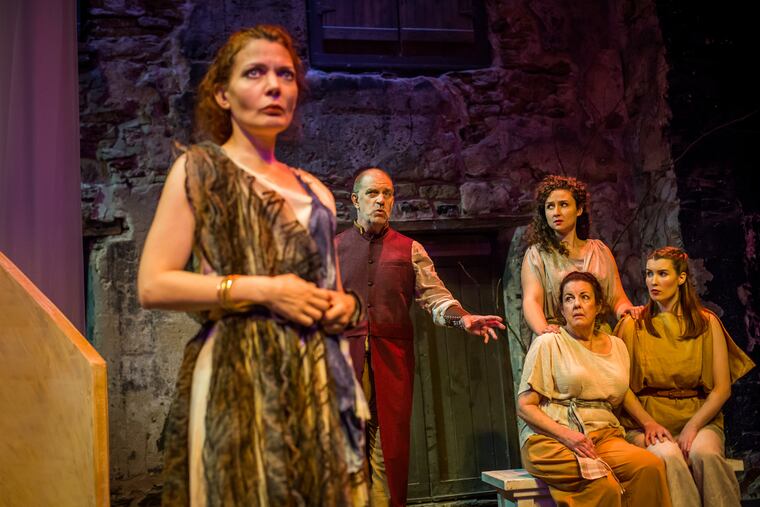‘Medea’ at the Hedgerow Theatre: There will be blood
Euripides' tragedy of the vengeful, magnificent filicidal wife of Jason gets a stripped-down treatment at the Hedgerow that nevertheless stays true to the muscular rendition by Robinson Jeffers (itself a classic), managing to evoke a universe far wider than the theater.

Robinson Jeffers' superb free rendering of Medea is now on stage at the Hedgerow Theatre through Nov. 11. Hedgerow lacks the budget for the opulent Medea you often see, but here, intimacy magnifies the fury.
What a splendid moment for Jennifer Summerfield as Medea. White-hot before the play even starts, Medea is seldom off the stage, yet Summerfield maintains admirable definition of line while jacked among the tragedy's perverse extremes, sometimes buckling in a mother's anguish. Summerfield makes her enormous eyes into emotional maps; her high cheekbones seem to stand for difference itself, her femininity/foreignness/otherness. Above all, Summerfield has timing and rhythm, so it's not all one scream. The Nurse (Jessica DalCanton) is similarly fine: Eyes trained right on us, DalCanton is at her best when the poetry is best: "This evil is not declining, it is just / at dawn. I dread the lion-eyed / glare of its noon."
Feminist play? No: moral outrage. If it's about anything, Medea, like The Bacchae, is about the irrational coming to undo our expectations. (Both Euripides and Jeffers were drawn to powerful, out-of-bounds female characters.) Medea commits the most heinous imaginable act — killing her children — with head clear, voice cold, hand steady. She explains to us, with appalling clarity, exactly why she's doing it. Down go the leaders of Corinth, along with two families: her own with unfaithful Jason (played with clueless hopelessness by Jared Reed), and that of Creon, father to the woman Jason has married in her place. And she gets away with it.
Hedgerow plays the ironies well. The rationalists are weak, Medea terribly lucid. (Director Megan Slater and lighting designer Andrea Rumble-Moore ensure that Jason and Creon are shadowed, while Medea and the Nurse are often in glaring, inescapable light.) Corinth and Athens falter. Creon, ruler of Corinth, is played with meat-headed stolidity by John Lopes. He lapses when he grants Medea a little more time to leave, and he knows it ("a woman weeping / floods me off course"). And Egeus of Athens (Adam Altman) is a diffident ditherer.
Sara Outing's set features a handsome, curving staircase emptying center-stage, with the Hedgerow's old mill wall making a fine classical backdrop. The bargain-basement feeling of some Hedgerow productions is more than balanced by the main performances. The Chorus (Minou Pourshariati, Juliane Schuab, and Susan Wefel) should but don't match the intensity of Summerfield and DalCanton. I was, however, glad the Chorus sang, to lovely guitar work by Christopher Waters, though there's still, as in many Medea productions, awkwardness in segueing smoothly to song.
In one of the play's most modern-seeming, most perverse moments, Medea says to Jason: "Now of all men / You are utterly the most miserable, as I of women. / But I, as woman, despised, a foreigner, alone / Against you and the might of Corinth / Have met you, throat for throat, evil for evil, vengeance for vengeance." Hedgerow's Medea speaks of a woman and foreigner who embraces her new land, which takes what it can then banishes her; it seems to channel an implacable violence underlying all. State and family fall. We could subtitle it 2018 if we wanted.